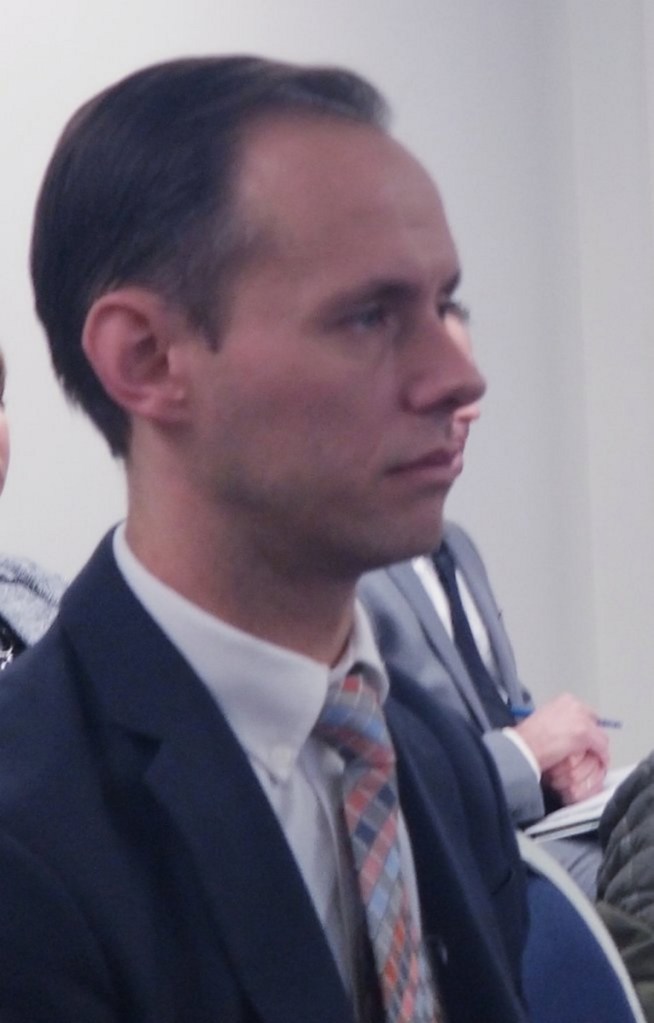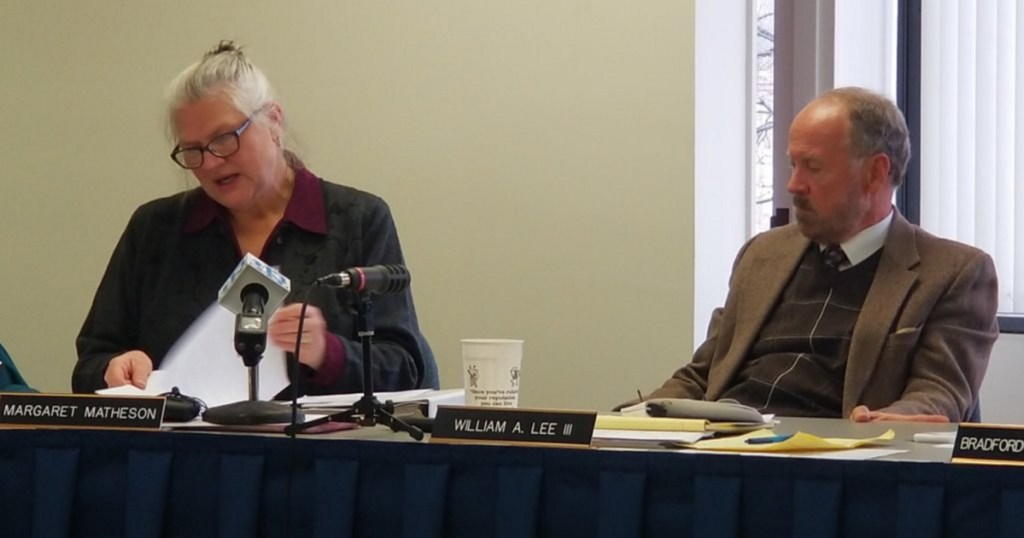
Maine Republican Party Executive Director Jason Savage delivering a “Fake News Alert” last year discussing a story his party thought failed to meet the standards of good journalism. From a Maine Republican Party video
AUGUSTA — The Maine Ethics Commission opted Thursday to drop a possible investigation into allegations that a key state GOP official did something improper when he created a website to deliver news with a conservative slant without disclosing his role.
That site, the Maine Examiner, drew attention in December after it revealed a controversial cache of internal campaign emails from Lewiston mayoral hopeful Ben Chin that were shared widely in the days leading up to a Dec. 12 runoff vote that Chin lost narrowly to Republican Shane Bouchard.
Kate Knox, a Democratic lawyer, told the commission the Examiner’s stories about Chin might have been “fundamental to the fact that Ben Chin lost” and certainly played “a big part” in the final days of the race.
The ethics panel voted 3-2 not to pursue a complaint by the Maine Democratic Party that Jason Savage, the executive director of the state Republicans, might have violated campaign finance rules by failing to report his involvement with the Examiner.
The swing vote belonged to the five-member panel’s chairwoman, Margaret Matheson, who backed the decision not to pursue the ethics complaint filed by Democrats despite calling Savage’s lack of disclosure disturbing.
She said it was “not a great thing to do” for him to operate in secret to create, oversee and write for the Examiner. But Matheson said she wasn’t convinced that a probe would find anything more.
Demi Kouzounas, chairwoman of the state GOP, said the commission “proved its integrity today, dismissing baseless accusations. From the beginning, we told the people of Maine this charge was without merit, and today we were vindicated.”
Savage, who talked openly about his role for the first time during the more than three-hour session, called it a victory for free speech.
Despite an agreement not to pursue the case, four of the five members expressed serious reservations about the way Savage created a site without identifying himself and used it to push a Republican-friendly agenda.
“There’s something unsavory about this,” said Bradford Pattershall, a commissioner. But he said the publicity that surrounded Savage ought to help get the word out that others shouldn’t follow the GOP official’s lead.
The two commissioners who sought to investigate more said they wanted ethics staff members to find out if they could turn up evidence that would show more definitively whether Savage’s claim that he acted entirely separate from the Republican Party was true.
William Lee III, who pushed hardest for a probe, said Savage’s secrecy about his connection to the Examiner — something that wasn’t known until a California expert found Savage’s name in the site’s metadata — raised questions.
“If there’s nothing to hide, why hide?” he asked. “What’s the reason for keeping it secret?”
Savage, though, had an answer.
He said he created the Examiner in September because he enjoys writing and wanted a venue to pursue it. He said it wasn’t all about politics, insisting his anonymous stories touched on “a lot of different things.”
Savage said he kept his name off the site because he hoped it would become “a larger, more robust entity” in the future if he could avoid the attacks that would inevitably follow if “certain people” knew about his role.
The Examiner, he said, is a model for the “community-based news” site he envisioned it could become — not a partisan project but an avenue to pursue a dream.
Besides, Savage said, leaving his name out of it allowed him to write about things the GOP’s executive director might have a touchier time discussing. He cited as an example a story he wrote about the tax breaks that rich people and big businesses receive, content that readers might view differently if they knew he wrote it.
Richard Nass, another commission member, said the Democrats who complained about the case presented “a confusing situation” and wanted the panel to sort it out, something he vehemently opposed.
“We’re not the FBI here,” Nass said. He said he couldn’t see anywhere for an investigation to go.
Lee said he thought further investigation would serve a useful function of determining the truth and would avoid leaving Savage “under a cloud of suspicion.”
Digging into the Examiner and Savage may find “this is his little baby and he did it all by himself.”
Nass said, though, that articles in newspapers such as The Boston Globe, the Bangor Daily News and the Portland Press Herald are responsible for raising that cloud — and more investigation wouldn’t help clear the air.
“These people, they’re all lined up on one side already,” Nass said. “Who’s establishing their legitimacy?”
“But we know who they are,” Matheson responded.
“Yeah, we know who they are, all right,” Nass answered.
Meri Lowry, a commission member, said her concern is that the Examiner operated without telling readers who owned it.
“I’m troubled by the anonymity, which goes against the purpose” of campaign finance disclosure laws, Lowry said. What that meant, she said, is that voters in Lewiston who were exposed to its stories “didn’t have the chance to consider” they “were authored by Mr. Savage,” a fact that might have changed their view of what they were looking at.
Knox said that Savage’s stories took aim at Democrats, an indication that Savage was just doing his job for the GOP.
“He was doing exactly the same activities he would have been doing with the party,” Knox said.
Pattershall said Savage is “intertwined with the Republican Party. There’s no question about that.”
Lee said he is worried that secretive websites such as the Examiner offer “a potential for real abuse” in the months and years ahead.
Maine Democratic Party Chairman Phil Bartlett said in a prepared statement that despite the panel’s decision, “it is clear to us that they were universally disturbed by Savage’s behavior, skeptical of his explanations, and disapproving of his anonymity.”
“As a result of this complaint, the Maine Democratic Party was able to drive Savage out of the shadows, hold him accountable to the public for his disturbing actions, and shine a bright light on the underhanded tactics that he and the Maine Republican Party are willing to engage in,” Bartlett said.
Savage insisted that whatever work he did for the Examiner was on his own time, not the hours the GOP paid for him to work.
“I was very careful in every way” to “have a line between my activities and the party,” Savage said, pointing out that his work schedule varied widely from week to week. He said he doesn’t have a clear schedule, just a requirement he gets the job done.
One of the issues the commission focused on was the purchase of Facebook advertisements by the state GOP that shared links to the Examiner stories about Chin in the week before the Lewiston election in December.
Savage said he talked with Kouzounas about whether to take out $950 worth of ads. She agreed. She said in a written statement that she talked with Savage about the validity of the claims in the Examiner stories and was satisfied they were true.
Savage said he never told her he wrote the stories, merely that “we knew they were real.”
“I knew that material was real and it wasn’t made up,” Savage said he told his boss.
Savage is still publishing on the Examiner’s website. But he may go further still.
Savage said he wants to publish a book, too, “on all sorts of ways to restore integrity in state government.”
Copy the Story LinkSend questions/comments to the editors.




Success. Please wait for the page to reload. If the page does not reload within 5 seconds, please refresh the page.
Enter your email and password to access comments.
Hi, to comment on stories you must . This profile is in addition to your subscription and website login.
Already have a commenting profile? .
Invalid username/password.
Please check your email to confirm and complete your registration.
Only subscribers are eligible to post comments. Please subscribe or login first for digital access. Here’s why.
Use the form below to reset your password. When you've submitted your account email, we will send an email with a reset code.